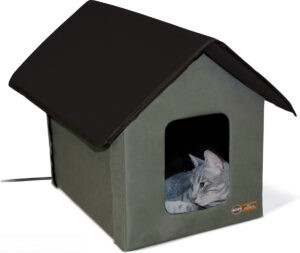Pre-Built | Assembly Required: Easy | Moderate | Advanced
Providing an outdoor shelter for community cats is one of the best ways to improve your community for all of its members! Not only do shelters provide cats a safe place to rest, they enable community cat caregivers to monitor their colonies’ wellbeing and easier predict cats’ location to practice Trap-Neuter-Return (TNR). You can find options ranging from cost-effective DIY blueprints to pre-built cat condos all over the internet, or get creative and try your hand making your own unique cat shelter.
Buy the perfect feline home, organize a shelter building day with your community, or make a family event out of providing homemade shelters to community cats! Below are just some outdoor shelter options.
Learn what makes a good shelter for outdoor cats.
Looking for other ways to keep cats more comfortable outdoors? See our tips for winter, summer, and year-round care.
Pre-Built Cat Houses for Inclement Weather
K&H Outdoor Heated Kitty House
Advantages: Waterproof vinyl backing, easy to assemble, 2 exits, thermostat-controlled, heated floor pad, comfy.
Disadvantages: Cost, not as sturdy as more permanent shelters, may not provide adequate protection from predators because of the materials used and large door openings.
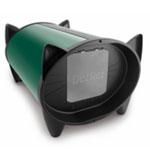
Advantages: Lightweight, protects from the elements.
Disadvantages: Cost, not well insulated, complaints about cracking in outer plastic.
Special thanks to Modern Cat.
The Kitty Tube
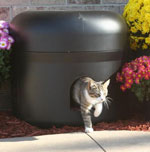
Advantages: Made from recycled materials, weatherproof, insulated, removable lid, easily cleanable, and comes with a “straw only” option.
Disadvantages: Cost, the pet bed option is not recommended for outdoor use.
Special thanks to The Kitty Tube.
Ark Workshop Outdoor Cat House
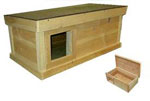
Advantages: Sturdy wooden construction, spacious, available with add-ons such as insulation, another exit, door flaps and overhangs, and risers..
Disadvantages: We don’t recommend some of the bedding options such as cedar and pine shavings. The base price is reasonable, but once you include add-ons, it can get pricey!
Special thanks to Ark Workshop
Alley Cat Allies’ DIY Outdoor CAT Shelter
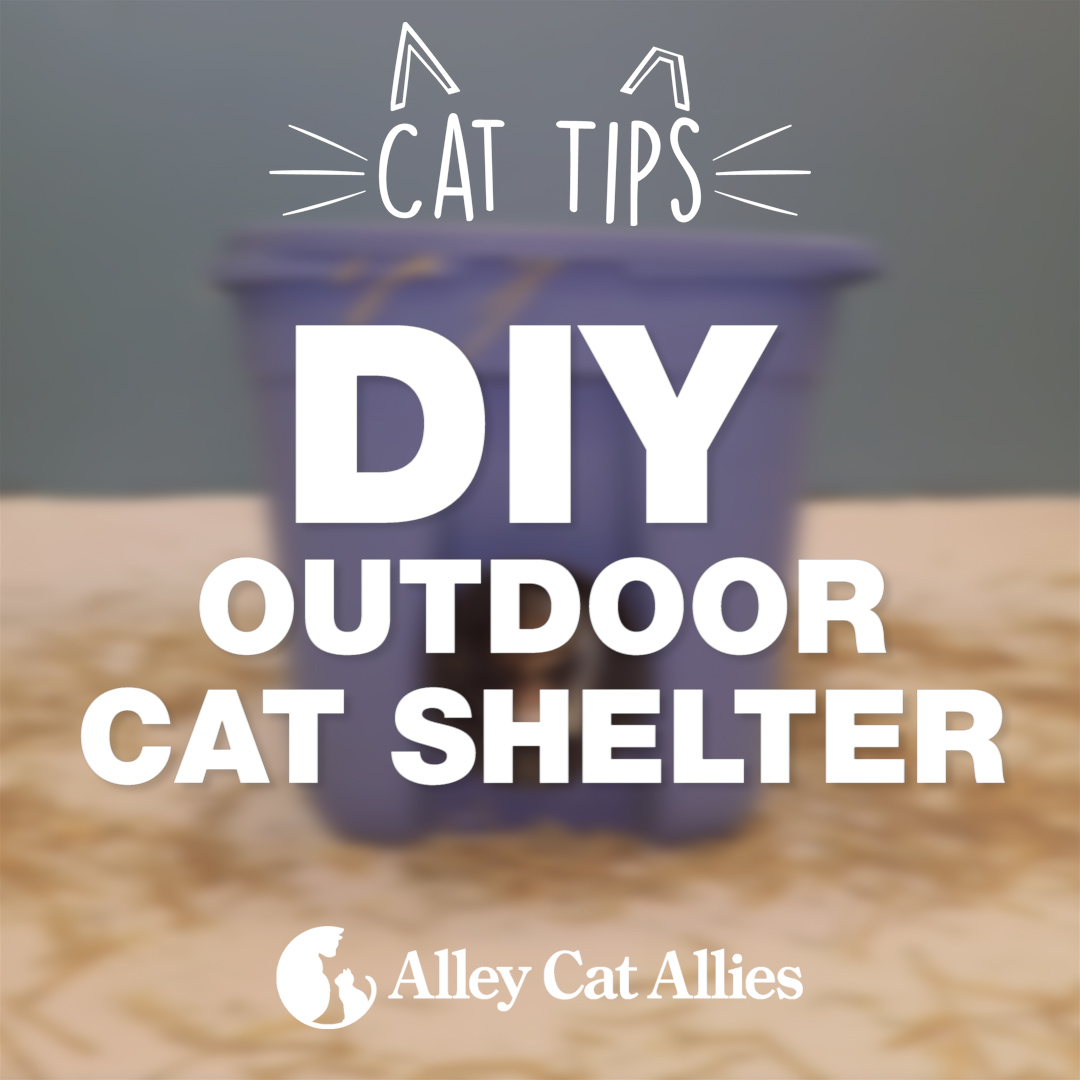
Advantages: Inexpensive, easy to build and transport.
Disadvantages: Lightweight provides less protection from predators than a wooden structure.
Faux Rock Shelter
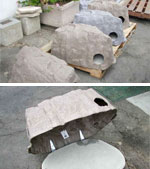
Advantages: Available at most home improvement stores and garden centers, well camouflaged.Possible Drawbacks: Prefabricated rocks can be expensive, tools will be necessary to cut opening and attach base.
Disadvantages: Prefabricated rocks can be expensive, tools will be necessary to cut opening and attach base.
Special Thanks to CSUN Catpeople.
Styrofoam Cooler Shelter
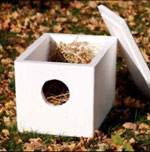
Advantages: Styrofoam cooler is available from hardware stores, grocery stores, restaurants, etc. Simple to make.
Disadvantages: Lightweight provides less protection from predators than a wooden structure. Cats may scratch Styrofoam. As with many of our low cost shelter options, this shelter is not weatherproof and will require more upkeep than some of the more permanent and professionally built shelters.
Try reinforcing this shelter by taping heavy duty lawn and garbage bags around the outside of it, to provide added protection from rain and snow.
Special Thanks to Indy Feral.
Spay And Stay Weatherproof Cat Shelter
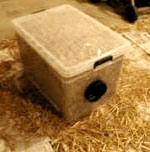
Advantages: Inexpensive, easy to build and transport.
Disadvantages: Lightweight provides less protection from predators than a wooden structure.
Special Thanks to Spay And Stay.
18-gallon PlasticTub Shelter
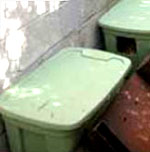
Advantages: Inexpensive, easy to build and transport.
Disadvantages: Lightweight provides less protection from predators than a wooden structure.
Special Thanks to Community Cats Maryland.
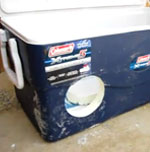
Advantages: Weather proof, pre-insulated, relatively inexpensive and includes an easy opening top for cleaning.
Disadvantages: Requires special tools for cutting an opening.
Corokitty Shelter
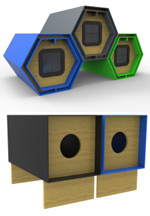
Advantages: Stylish and well designed. Simple, inexpensive, durable materials. Weather resistant. Variety of designs that can be easily modified. Some designs can be attached together to create multi-unit shelters.
Disadvantages: Requires some degree of skill and access to toolslike a jigsaw for cutting. Not all design plans are complete – the site is a work in progress – check back for updates.
Special Thanks to Chris Peterson.
Moderate DIY Winter Cat Shelters
Alley Cat Allies’ Inexpensive Do-It-Yourself Shelter
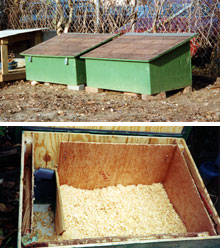
Advantages: Sturdy design, can house multiple cats, provides protection from predators.
Disadvantages: Building requires a moderate degree of skill.
“Dog House” Shelter
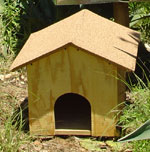
Advantages: Sturdy design, provides protection from predators.
Disadvantages: Building requires a moderate degree of skill.
FIVER Cats Raised Wooden Cat Shelter
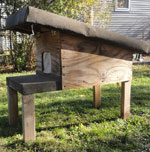
Advantages: Very sturdy, two exits, raised for potential high snowfall, can use water-resistant/proof material for roofing, small “porch” on front.
Disadvantages: Requires tools for construction, cost, larger size.
Special Thanks to FIVER Cats.
Camper Topper Shelter
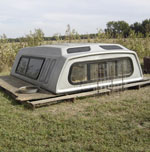
Advantages: Can house 10-15 cats, camper toppers are readily available for purchase.
Disadvantages: Requires some tools and moderate skill for modification.
Thanks to Friends of Felines in Sedgwick, Kansas.
Founded in 1990, Alley Cat Allies is the leading advocacy organization for cats with a mission to transform and develop communities to protect and improve the lives of all cats and kittens. Together with our over 1.5 million supporters, we work toward a world where cats are valued and every community has humane and effective programs and policies to defend them.
Through our fearless advocacy, humane care, education and outreach, and law and policy activism, we equip and mobilize citizens, advocates, grassroots groups, shelters, veterinary professionals, and elected officials across the United States and around the world to improve their communities for cats through nonlethal, evidence-based approaches.
Our website is www.alleycat.org, and we are active on Facebook, X (Twitter), Instagram, LinkedIn and YouTube. Charlene Pedrolie is the President and Chief Operating Officer of Alley Cat Allies.


